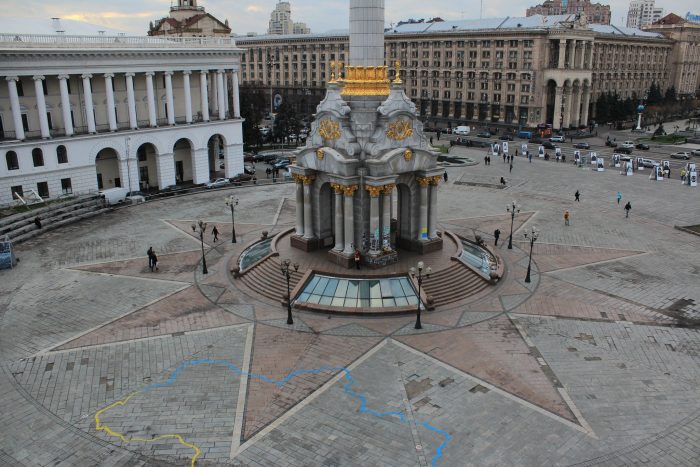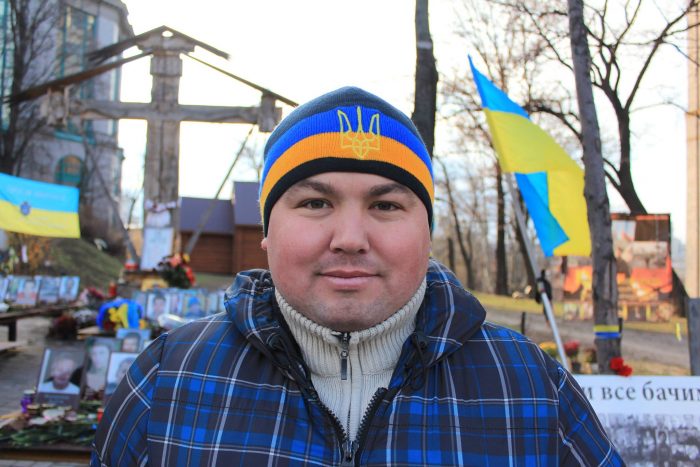By Iverson Ng
The 18th EU-Ukraine summit was held in late November with an EU financial assistance of further €104million(about HKD860,000,000) for public administration reform in Ukraine and a discussion on how to further implement the ceasefire agreement between the Ukrainian army and pro-Russian militia, or the so-called Minsk II Agreement. Moreover, the European Council and the European Parliament agreed on visa-liberalization for Ukrainian citizens travelling to the EU, yet a formal approval for the proposal will be needed. In spite of the progress of strengthening the EU-Ukraine relations, the possibility of an EU membership for Ukraine is far from realization.
Ukraine, a non-EU state, has been the spotlight of European politics since the pro-European movement in November 2013. The movement escalated into a revolution as at least 88 people died and hundreds were injured in mid-February 2014. After the end of the Ukrainian Revolution, the new government signed an EU-Ukraine Association Agreement to provide a Deep and Comprehensive Free Trade Area, strengthening the tie between Ukraine and the EU politically and economically. The Agreement seems to be a green light for Ukraine to establish a closer relationship with the EU, yet the road to be a member of the Union may take years, if not decades.

Maidan Nezalezhnosti, or the so-called Independence Square in Kyiv, Ukraine
National issues ahead of EU membership
According to the EU enlargement policy, there are three main stages for joining the EU. Any country that aspires to join the Union must be first in compliance with the core values of the EU in five areas: the rule of law, freedom of expression and media, civil society, regional cooperation, and economic governance. Once the country is officially recognized by the EU as a candidate country, it can move on to formal membership negotiations. The country has to prepare to implement and enforce EU rules in 35 different policy fields (the “acquis”) in order to fulfill the conditions for membership. The candidate country will be part of the European Union after it has won the support of the EU Council, the Commission and the European Parliament, along with signatures from the candidate country and all EU countries’ representatives as well as ratifications by the candidate country and every EU country, according to their constitutional rules.
As the armed conflict in eastern Ukraine has been going on for two and a half years, the territorial integrity of Ukraine is undermined by a group of pro-Russian militia in Luhansk and Donetsk regions who declared independence from Ukraine illegally. If Ukraine wants to be part of the EU, it must first restore stability and regain full independence from external forces which undermine its sovereignty.
Let alone the military conflicts of eastern Ukraine, the corruption issue remains severe as the Corruption Perceptions Index of Ukraine ranks 130/168, according to the anti-corruption agency Transparency International. The seriousness of corruption means ineffective governance and inefficient implementations of different policies. The Ukrainian government recently appointed a 24-year-old former Ukrainian MP assistant as the new Deputy Minister for the Ministry of Internal Affairs of Ukraine and a 23-year-old recent law graduate as the temporary head of the Justice Ministry’s department of “lustration”, which targets corrupted government officials. Yet, the latest appointments received more skeptics than supporters as the new appointees are “young” with “little experience”.
The Ukrainian government has been undergoing a series of reforms including anti-corruption measures, constitutional and parliamentary reforms, economic policies, and decentralization. Newly established National Anti-Corruption Bureau started investigations of high-level corruption cases and the National Agency for Prevention of Corruption launched electronic asset declaration system in September 2016 to improve transparency. Amendments to the law on asset management and recovery introduced in June will make it easier to identify, trace and manage assets obtained from illegal activities.
To reform the government, the Ukrainian parliament adopted constitutional amendments for the merger of municipalities and fiscal decentralization in the first reading, but the second reading is still pending. For the improvement of transparency, it becomes more accessible for the public to obtain information along with an empowered Ombudsperson’s office to oversee this process.
Ukraine is stabilizing its economy by implementing macroeconomic policies and financial and technical assistance with EU’s provision of a €3.4billion (about HKD 28 billion) in the macro-financial assistance programme. Looking ahead, the EU will support Ukraine’s new anti-corruption bodies and the monitoring of anti-corruption efforts by the parliament and civil society with €15 million (about HKD124,000,000), decentralization with €97million (about HKD800,000,000) and rule of law with €52.5million (about HKD433,000,000).
Ukraine and Eastern Partnership
Currently Ukraine, Armenia, Azerbaijan, Belarus, Georgia and Moldova are part of the Eastern Partnership, a joint initiative which aims at strengthening bilateral cooperation between the EU and its eastern neighbors and fosters commitment to the principles of democracy, the rule of law, human rights and fundamental freedoms in those countries. So far, none of the countries in the Eastern Partnership is recognized as a potential candidate or candidate country of the EU.
烏克蘭的漫長改革
文:伍鎮星

「烏克蘭革命」的其中一位示威者
第十八屆歐盟—烏克蘭高峰會早前於十一月尾舉行,並確定為烏克蘭進一步提供€104,000,000 (約8億6千萬港元),以改革當地的公共行政。高峰會更歡迎歐洲理事會同意開放簽證給烏克蘭,可是前提是任何歐盟國家可以要求歐洲委員會啟動「緊急剎車」機制以暫停免簽證來應付突發情況,例如急促上升的非正規移民數目。而會議中亦討論如何進一步落實烏克蘭政府軍及親付武裝份子如何落實停火協議,又稱「明斯克協議」。不過,烏國加入歐盟的時間表仍是遙遙無期。
自2013年11月開始,烏克蘭因為一場親歐社會運動而成為了歐洲政治的焦點,而運動的初期大致和平,但後期卻以血腥的方式結束,據報最少有88人於革命中死亡,數百人受傷。在「鳥克蘭革命」完結後,當時新上任的政府簽下了歐盟—烏克蘭《結盟協定》來提供「自由貿易區域」,以加強烏克蘭與歐盟在政治及經濟上的聯繫。雖然整個協定看來是為烏克蘭跟歐盟建立更緊密關係亮起綠燈,可是若要烏克蘭成為歐盟成員國的話,過程可能需要幾年,甚至幾十年。

位於烏克蘭首都基輔的「獨立廣場」
加入歐盟前,先想國家問題
根據現時歐盟的擴張政策,加入歐盟有以下三個步驟。任何國家若要加入歐盟,首先要遵守歐盟的五個核心價值:法治、表達及媒體自由、公民社會、區域合作及經濟治理。當歐盟正式承認該國家為候選成員國,便會就會員資格談判。在談判期間,候選國需要準備及落實三十五不同政策範疇(法律系統),以符合會員資格。當候選成員國得到歐洲高峰會、歐洲理事會及歐洲議會的支持,還有候選成員國與所有歐盟成員國的簽署,以及根據候選成員國與所有歐盟國家的憲法下的批准,便會成為歐盟成員國。
烏克蘭東部的武裝衝突持續了兩年半,而長駐頓涅茨克及盧斯甘克的親俄武裝份子於當地非法宣佈獨立,削弱了烏克蘭的領土完整性。如果烏克蘭希望加入歐盟,便先要回復穩定,在給外來勢力削弱主權後重奪自主權。
除了烏克蘭東部的武裝衝突外,根據國際反貪腐組織「透明國際」的「貪腐觀感指數」指出,烏國於全球168個國家中排130。而嚴重的貪腐情況拖累管治效率,令政策更難落實。最近,烏克蘭政府不但委任了一位24歲的前議員助理為烏克蘭內務副部長,還委任了一位23歲、剛從法律系畢業的大學生為法律部下的反貪部門的臨時首長。不過,民眾對最新的任命沒有太多支持,只有更多懷疑,並認為兩位新任命的官員「太年輕」及「少經驗」。
烏克蘭政府一直在反貪腐、憲制、議會、經濟政策及「分權」方面改革。最新成立的國家反貪腐部門開始調查有關高層貪腐案件,而國家 防止貪污機構則在今年九月啟用了電子資產申報系統,以提高透明度。有關資產管理及追回的法例修改早於今年六月提出,令當局更容易辨認、追蹤及管理從非法途徑得來的資產。
為了改革現屆政府,烏克蘭議會在一讀中通過憲法修訂以合併市鎮及財政下放,但二讀仍是有待通過。此外,為了提高透明度,在申訴專員辦公室的協助下,讓公眾更易得到資訊。
烏克蘭現正透過落實宏觀經濟措施以穩定其經濟。在歐盟財政援助計劃下,烏國將會得到34億歐元(約280億港元)用作金融及技術援助。
歐盟將會提供1500萬歐元(約1億2400萬港元)來支持烏克蘭的最新反貪腐機構及透過議會和公民社會來監察反貪腐進度,亦會提供9700萬歐元(約8億港元)讓當地實行「分權」政策,還會提供5250萬歐元(約4億3300萬港元)來改善當地的法治。
烏克蘭與東部夥伴關係
現時,烏克蘭、亞美尼亞、阿塞拜彊、白俄羅斯、格魯吉亞及摩爾多瓦均是「東部夥伴關係」的成員國,而整個夥伴關係的目標是加強歐盟及其東部盟友的合作,並督促有關國家落實民主、法治、人權及基本自由的承諾。目前為止,歐盟暫時未有承認任何「東部夥伴關係」的成員國為潛在候選歐盟成員國或候選歐盟成員國。

